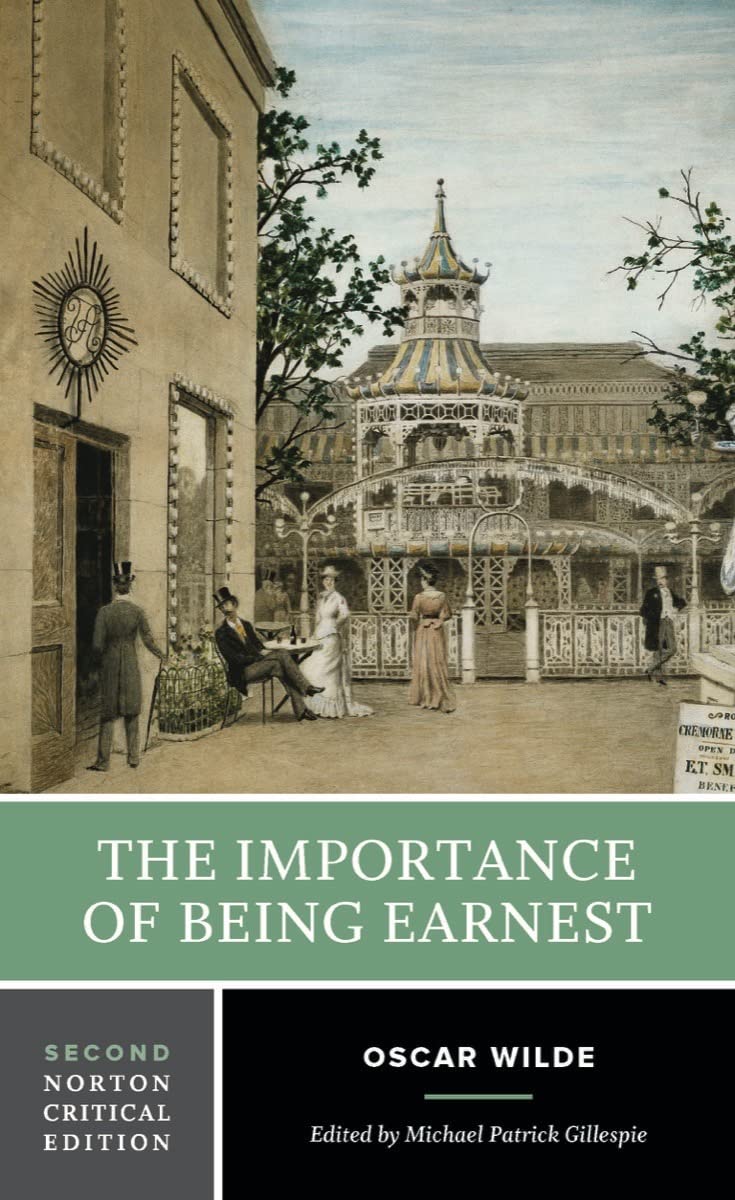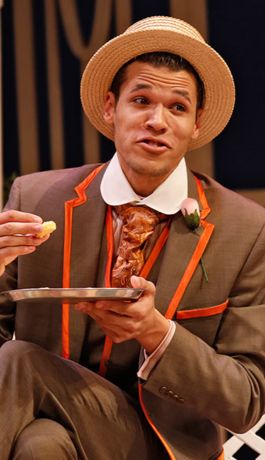Wilde’s Magnificent Comedy of Manners
What happens when you mix mistaken identities, cucumber sandwiches, and a rather controversial handbag? You get Oscar Wilde’s masterpiece of wit and social satire, “The Importance of Being Earnest.” First performed in 1895 at London’s St. James’s Theatre, this play represents the pinnacle of Victorian comedy and continues to delight audiences with its razor-sharp dialogue and brilliant observations of social pretense.
Quick Facts
- First performed: February 14, 1895, St. James’s Theatre, London
- Original title: The Importance of Being Earnest, A Trivial Comedy for Serious People
- Runtime: Approximately 2 hours and 20 minutes
- Structure: Three acts
- Notable adaptations: 1952 film starring Michael Redgrave, 2002 film with Colin Firth and Rupert Everett
- Famous line: “A handbag?”
Just want to read the play?

Norton critical edition
Includes important notes on text versions, context, and also has critical essays on the play.
Oxford Classics – The Major Works
Includes The Picture of Dorian Gray, Lady Windermere’s Fan, The Importance of Being Earnest and more.

Oliver Parker 2002 film version starring Judi Dench
Also inclides Reese Witherspoon, Colin Firth, and Rupert Everett.
Free version? Try the version on Project Gutenberg: https://www.gutenberg.org/files/844/844-h/844-h.htm
Historical Context
When Wilde premiered “The Importance of Being Earnest,” Victorian society was at its height of rigid social conventions and moral strictures. The upper classes were obsessed with manners, marriage, and maintaining appearances. Wilde, as an outsider looking in (despite his social success), was perfectly positioned to skewer these conventions.
The play opened to tremendous acclaim but ran for only 86 performances before scandal forced it to close. Wilde was arrested for “gross indecency” during the run, leading to his eventual imprisonment and exile. This context adds a layer of poignant irony to a play all about maintaining false identities to navigate society’s expectations.
Plot Overview
The story follows two friends: the responsible John Worthing, who invents a troublesome brother named Ernest to escape his duties, and the dandyish Algernon Moncrieff, who creates an invalid friend named Bunbury to avoid social obligations. Both men use their fictional alter egos to pursue romance – John with Algernon’s cousin Gwendolen, and Algernon with John’s ward Cecily.
Complications arise when both women declare they could only love a man named Ernest (a pun on “earnest” that runs throughout the play). The situation becomes increasingly complex with the arrival of the formidable Lady Bracknell, whose famous interrogation of John’s background leads to the revelation about his origins – he was found in a handbag at Victoria Station.
Themes & Analysis
The Nature of Identity
At its heart, the play explores the gap between public and private selves. Every character maintains a social facade, reflecting the Victorian preoccupation with appearances. The name “Ernest” becomes both a literal false identity and a symbol of social hypocrisy – being earnest while not being Ernest.
Marriage and Social Status
Wilde brilliantly satirizes Victorian marriage customs, particularly among the upper classes. Gwendolen’s insistence on marrying someone named Ernest and Lady Bracknell’s focus on Jack’s social credentials reveal the superficiality of Victorian marriage prerequisites.
The Absurdity of Social Conventions
From the precise cutting of cucumber sandwiches to the proper way to propose marriage, Wilde mercilessly mocks the trivial concerns that occupied Victorian society. The play’s subtitle, “A Trivial Comedy for Serious People,” perfectly encapsulates this theme.
Revolutionary Elements
What makes “Earnest” revolutionary is its perfect marriage of form and content. While appearing to be a light drawing-room comedy, it actually subverts the very conventions it seems to embrace. Wilde’s epigrams (“In matters of grave importance, style, not sincerity, is the vital thing”) work both as witty dialogue and as commentary on social artifice.
Cultural Impact
The play has become the definitive comedy of manners, influencing countless subsequent works. Its dialogue has entered common usage (“To lose one parent may be regarded as a misfortune; to lose both looks like carelessness”), and its structure has become a template for social comedy.
Staging & Performance
The play demands precise timing and delivery. The success of productions often hinges on the chemistry between Jack and Algernon, and the commanding presence of Lady Bracknell. Modern productions have ranged from traditional Victorian settings to contemporary reinterpretations, though the original period setting tends to work best with the play’s social satire.
Reading Guide
Best Editions
- The Norton Critical Edition (includes excellent annotations and contextual materials)
- The New Mermaids Edition (good for performance analysis)
- The Methuen Student Edition (ideal for first-time readers)
Reading Tips
- Pay attention to the double meanings in seemingly throwaway lines
- Notice how food (particularly cucumber sandwiches) functions as a social marker
- Watch for parallels between the city and country scenes
- Observe how each character’s language reveals their true nature
Contemporary Relevance
Despite its Victorian setting, the play’s themes of social pretense and identity remain startlingly relevant. In our era of social media personas and carefully curated public images, Wilde’s exploration of authentic versus constructed identity feels particularly pertinent.
Fun Facts & Trivia
- The play was almost called “Lady Lancing” during development
- The character of Lady Bracknell was inspired by Wilde’s mother
- The original production’s rehearsals were plagued by actors breaking into laughter
- Wilde made last-minute revisions to tighten the play from four acts to three
Why This Play Endures
“The Importance of Being Earnest” achieves that rare balance of being both intellectually stimulating and thoroughly entertaining. Its wit never ages, its observations remain sharp, and its humor continues to delight audiences worldwide. The play’s exploration of identity, social expectations, and the masks we wear feels as relevant today as it did in 1895.
This is more than just a comedy – it’s a masterclass in wit, a sharp social satire, and a perfectly constructed farce. Whether you’re a first-time reader or returning for another visit, Wilde’s masterpiece rewards close reading while remaining delightfully accessible. In a world still obsessed with appearance and authenticity, being Ernest (or earnest) remains as important as ever.
Additional Resources
- “Oscar Wilde: The Unrepentant Years” by Nicholas Frankel
- The Oscar Wilde Society’s study guides
- BBC Radio 4’s In Our Time episode on the play
- The British Library’s collection of original manuscripts and notes
Remember, as Wilde himself might say, the only thing worse than not reading “The Importance of Being Earnest” is not reading it earnestly.


